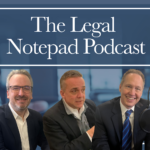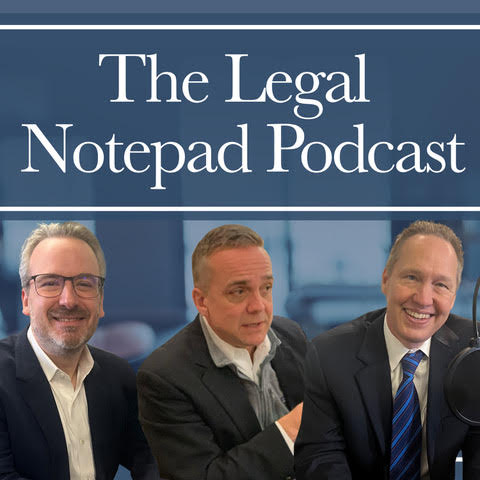Episode 4: Louisville attorneys Rob Mattingly and Kevin C. Burke continue their discussion of Kentucky law. They’re joined by Rob’s paralegal, Lauren Hincks. They’ll focus specifically on Fratzke. It’s an issue many attorneys get wrong. This episode continues a series of legally-focused episodes geared toward helping Kentucky attorneys.
Editor’s Note: If you are an attorney and would like CLE credit for this episode, visit the Kentucky Justice Association website, click the Education and Training tab and look for the podcast.
TODAY’S LEGAL QUESTION:
What is Fratzke and How Can Lawyers Avoid Making a Fratzke Mistake?
Kevin starts off by citing the KY Supreme Court case of Fratzke v. Murphy, 12 S.W.3d 269. Rob summarizes the facts of the case as follows. It involved a pedestrian walking a picket line and was struck by a vehicle. The case proceeded to trial. The plaintiff attorney included details regarding the damages being sought. Defense objected because the damages had not been itemized in pre-trial. Defense argued because damages hadn’t been specified, they couldn’t be discussed during trial or asked for at the end of the trial. Rob states this issue began an entire body of law in the Commonwealth.
Kevin comments that the case took place in 1995 and what we know today wasn’t part of the law, at the time. In real time, the issue wasn’t clearly defined. Now that we have an opinion and the benefit of hindsight, it’s easier to understand.
Defense made an argument based on paragraph 2 of Civil Rule 8.01. They’d sent an interrogator to plaintiff’s counsel. It wasn’t answered; therefore, the plaintiff isn’t entitled to an award. The trial judge disagreed.
The case went to trail and a plaintiff’s verdict for compensatory damages was award. Defense appealed. The KY Court of Appeals initially affirms the trial court’s decision. However, on reconsideration, based on recently decided Burns v. Level (957 S.W.2d 218), they sided with the defendant.
The KY Supreme Court takes the case. It agrees that Burns applies. The Court recognizes that the trial court had discretion to grant a directed verdict based on CR 801. Both sides are using Burns. The Supreme Court ultimately created a harsh rule that if counsel doesn’t itemize damages, it will be bound by the last number indicated in answers to the interrogatories.
Rob points out the plaintiff’s counsel didn’t specify damages until much later in the trial, not during pre-trial. The Supreme Court noted that plaintiff’s counsel was required to file a motion for leave to supplement the interrogatory answers.
Kevin points out how the Supreme Court’s opinion claimed it was not including a landmine in civil litigation. There were 2 dissents. He tends to disagree with that view, given the reality of the rule.
Lauren observes that Rob and Kevin discuss the issue “gotchas” fairly often, including at the past year’s Kentucky Justice Association’s annual convention. Kevin comments that the various courts have tried to mitigate the harshness of the rule.
Rob and Kevin advise attorneys to go ahead and itemize the damages. Don’t wait. The rule is too harsh for you to gamble on it. Update your interrogatory answers, as needed. Kevin says you should never have to ask yourself whether you’ve done enough. Instead, assure yourself you have by being vigilant.

Discussion of 4 Cases Related to Fratzke
Now, Rob and Kevin will highlight 4 important cases.
- LaFleur v. Shoney’s Inc., 83 S.W.3d 474
- Prater v. Castle, 139 S.W.3d 921
- Tennill v. Talai, 277 S.W.3d 248
- Chesapeake Appalachia, LLC v. Collins 213 WL 645913 (WestLaw)
LaFleur v. Shoney’s Inc.
This is a slip and fall case at a restaurant. The trial court ordered the plaintiff to itemize damages within 10 days of trial, independent of the defense counsel’s interrogatories. Plaintiff’s counsel filed the itemization within 5 days of trial, which was significantly larger than listed in the answers to the interrogatories.
Defense argued the plaintiff made a Fratzke violation (being 5 days late or beyond the window stipulated in the Order), and thus should be limited to the initial amounts listed in their answers. The trial judge decided to let it proceed to trial and full damages were on the table. The jury returned a plaintiff’s verdict.
The case is eventually heard by the KY Supreme Court. The Court applies Fratzke. The plaintiff should have moved for leave, which they didn’t, even though they did amend the answers to the interrogatories. Rob notes this sounds like a technicality, but you really need to have that Order involving the court’s use of discretion.
Rob recommends you always answer the damage interrogatories as soon as possible. If you don’t do that, always file the motion to amend the interrogatories, asking to extend the trial order date. The judge has discretion, but you need to make the motion.
Lauren asks, “What should an attorney do if the request for itemization isn’t included in the interrogatories?” Kevin recommends you always file an itemization of damages. It may not be included in the interrogatories. There will usually be a trial court order, anyway. Even if there’s not a court order, file the itemizations anyway.
There’s a change you may encounter a local rule that requires the itemization of damages. If you don’t do it because it wasn’t in the interrogatories and the judge didn’t issue an order, you still may run into problems because you didn’t comply with local rules. Again, it’s best to just file the itemizations.
Prater v. Castle
Kevin explains the difference is as follows. The case gets to trial. The plaintiff didn’t provide the itemization. Defense argues a Fratzke violation has occurred, citing LaFleur. The plaintiff then files a motion for leave. The trial court interprets Fratzke and LaFleur to require the plaintiff to have to move for leave before the defendant objects.
The Court of Appeals rules the trial court had the discretion to consider/grant the motion for leave. They remand it back to have the trial judge rule on the merits of the original motion. Kevin points out that this was another move to deal with the harshness of the Fratzke opinion.
Tennill v. Talai
Kevin observes that Prater happened in 2003 and Tennill occurred in 2009. However, in between these 2 cases, CR801 was amended to include, “…provided however that the trial court has discretion to allow a supplement to the answers to the interrogatories, at any time, where there has been no prejudice to the defendant.”
The amendment puts authorizes the trial court to allow the amendment and gives a standard for it.
Kevin explains the basics of the Tennill case. It was a default judgement case. Liability was conceded. The defendant is entitled to a hearing on damages. The defendant sent a request for itemized damages to the plaintiff, prior to the hearing. The plaintiff does not file an answer to the interrogatory.
The defense deposes the plaintiff, prior to the damages hearing. During the deposition, the plaintiff isn’t asked about damages or the itemization thereof.
Eventually, the case gets to the KY Supreme Court. The Court focused on whether a Fratzke violation occurred related to the damages. The Court understood the defense didn’t ask about the damages during the deposition. Therefore, by neglecting to ask, the defense waived Fratzke.
Kevin comments, again, this is another attempt by the Supreme Court to mitigate the harshness of the Fratzke rule. Both Rob and Kevin remind you that you never want to have to rely on Tennill. Attorneys should always file the itemizations.
Lauren asks about cases in which there are claims for punitive damages. This brings us to our last case.
Chesapeake Appalachia, LLC v. Collins
While this case is unpublished, it addresses the issue of punitive damages and Fratzke. The question is whether punitive damages must also be itemized, in addition to compensatory damages?
Kevin clarifies that you still need to itemize your punitive damages. Fratzke focuses on unliquidated damages. The Court said, in Collins, a specific dollar amount is required in the itemizations to comply with Fratzke.
In conclusion, Rob also reminds attorneys there’s a rule regarding the itemization of medical expenses. You need to do more than just the summaries you intend to use at trial. As with other topic, this issue will eventually be covered in a future episode.
Please help us to grow the Life, Love and Law Podcast by sharing this episode on your social media and sending a link to your friends and colleagues.
Rob challenges each of you to go out and find one thing, today, you can do to help change the world.
Thanks for listening!
For More Information about the Law Offices of DeCamillis and Mattingly, PLLC
Address: 138 S. Third Street, Louisville, KY 40202 (across from The Old Spaghetti Factory)
Phone: (502) 589-2822
Website: DeCamillisMattingly.com
To Contact Kevin Burke:
Website: BurkeNeal.com
Phone: (502) 709-9975
The Kentucky Bar Association Requires Us to State “This is an advertisement.”



